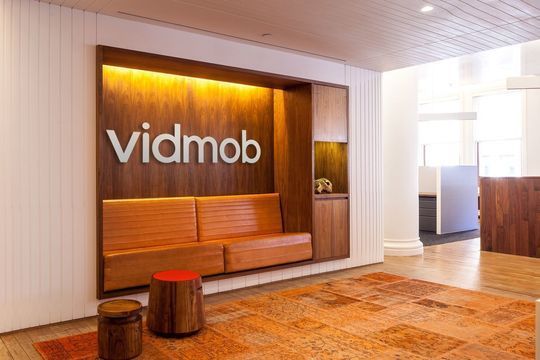
Originally published on The Wall Street Journal
Software company VidMob Inc. said it closed a Series D funding round for $110 million as it seeks to expand its offerings that help marketers make and improve their digital advertising.
The round was led by Shamrock Capital and included new investors eGateway Capital Advisors and venture-capital firm Proof. Existing investors including ID Funds and Drive by DraftKings also participated in the round.
VidMob has now raised $210 million and is valued at close to $500 million, according to people familiar with the matter. The company was valued at $290 million when it closed its Series C round in 2021, people familiar with the matter said at the time.
The company employs 350 people, it said.
Founded in 2014, New York-based VidMob says its software helps marketers analyze the quality of the creative content in their digital ads and use data and other insights to help improve the performance of the advertising.
VidMob works with companies including ByteDance Ltd.’s TikTok, Snap Inc. and Meta Platforms Inc.’s Facebook and Instagram to help marketers make ads for those platforms. VidMob also works directly with clients such as L’Oreal, Johnson & Johnson and Anheuser-Busch InBev, along with advertising holding companies and agencies of various sizes.
VidMob says its services can help marketers amid budget cuts and challenges to online ad targeting.
“When you’re spending less on the media side, you have to regain the performance” to avoid hurting top-line results, VidMob CEO and founder Alex Collmer said.
The company’s place in an uncertain macroeconomic environment made it an attractive proposition for some investors.
“When you think about all of the uncertainty, macro pressures, scrutiny around advertising budgets, there’s a shift to performance, a shift to really wanting to be smarter about your dollars in this environment,” said Laura Held, a partner at Shamrock Capital.
VidMob intends to use the new funding to help build a platform that would help businesses centralize creative activities and provide data-informed creative in paid advertising and other areas, such as emails or product detail pages on commerce sites.
Mr. Collmer said closing the round was challenging given the current financial backdrop.
“I think in other markets, I would have expected that to be fairly easy, in a sense,” he said. He said that in late spring and early summer, some of the funds the company was talking to were saying they liked the business but didn’t know how to value anything in this market. “It was definitely a difficult environment,” he said.
Read the full article on The Wall Street Journal.
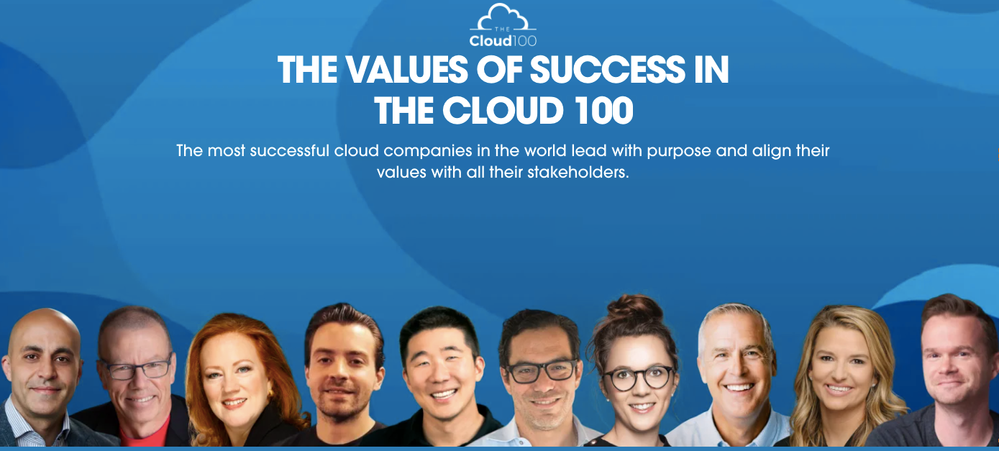
Originally published on Salesforce Ventures.
Cloud 100 companies are creative about the many ways in which they give back.
One of the ways companies do so is through joining Pledge 1% — a commitment to donate 1% of their profits, product, equity and/or time to charity. In fact, nearly one-third of the companies in Cloud 100 have taken the pledge. Others choose to support specific causes through financial donations via corporate-sponsored foundations, while others donate sweat equity to improve the lives of those around them.
Each year, at the Cloud 100, we award The Pledge 1% Impact Award to a company that demonstrates an outstanding commitment to giving back by not only taking the pledge but by delivering programs that make a measurable positive impact and working to empower other companies to do the same.
This year, the committee has selected Snyk as the 2022 Pledge 1% Impact Award winner based on Snyk’s consistent dedication to giving back and social responsibility. In addition to their donations as an organization, they’ve launched 1:1 matching grants up to USD $500 per year for eligible employee donations, and a Volunteer Time Off benefit for employees. Last year, they launched Snyk Impact to mobilize Snyk’s technology, resources and community to enable a more secure, inclusive and sustainable sector.
Career Opportunity Platform, Guild Education, offers all employees five paid days off to volunteer with causes or organizations within their communities. Guilders have used their volunteer days to engage in the civic process and serve as election judges, support those in need by making and delivering fresh meals, and improve their environment by restoring trails.
Collaboration software maker Front donates 1% of its equity and 1% of its products to various nonprofits and gives employees three paid days off per year to volunteer. Workers can choose to give their time to causes they care about or participate in group activities organized by the company, such as helping the homeless, domestic violence victims, and at-risk groups in the San Francisco Bay Area and Paris, France.
In 2018 the company launched The Front Foundation. Mathilde Collin, CEO, and Co-Founder of Front, was inspired by a book called Doing Good Better and felt Front had scaled to a point where the impact of having a foundation would be meaningful without being distracting. “Fronteers” from disparate geographies and teams are empowered to decide what charities they want to support.
“It contributes meaningfully to our culture because it helps people understand that life is greater than the product we build and the customer we serve,” says Collin. “It contributes to having a low-ego culture, keeps us grounded in reality, and contributes to our culture and retention.”
Read the full length feature and to hear more from Cloud 100 CEOs here.
Originally published on Business Wire.
Pledge 1%, a force multiplier and global movement to inspire, educate, and empower every entrepreneur, company, and employee to be a force for good, today announces that a growing number of top cloud companies on the Cloud 100 list, a prestigious ranking of top cloud companies made possible by Bessemer Venture Partners, Salesforce Ventures, and Forbes, have committed to leveraging their assets for good. Of the 100 companies on the list, nearly 30% are Pledge 1% members, reflecting the growing global push toward ESG and a more engaged business culture.
“The companies on this year’s Cloud 100 list that have partnered with Pledge 1% understand that leveraging their assets for social impact is both the right thing to do – AND the smart thing to do,” said Amy Lesnick, Chief Executive and President of Pledge 1%. “They serve as incredible role models for others by demonstrating the impact a company can have when they integrate social impact into their DNA and leverage their assets such as employee time, product, revenue, and/or stock equity to bring their company values to life for the long-term.”
Now more than ever, companies are realizing that they have an important role to play in tackling the toughest challenges of our time. With major shifts happening both on the global and local level, the need for businesses to give back has never been higher, matched only by consumer and employee expectations that companies take action. Increasingly, the companies that commit to supporting their local communities, authentically addressing pressing global social issues, and leveraging frameworks like Pledge 1% to fortify their ESG commitments, are proving to be the most successful.
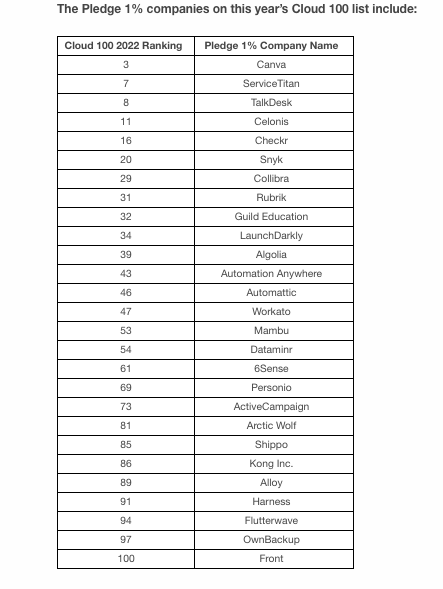
As part of today’s news, Pledge 1% is thrilled to announce that Snyk, a Boston-based cybersecurity company specializing in cloud computing and Pledge 1% member, is the winner of the annual Pledge 1% Impact Award.
Snyk donates approximately $600,000 annually to organizations aligning with its impact mission pillars: Diversifying the developer security talent pipeline, strengthening digital security in the nonprofit and impact sector through freemium and discounted product offerings, sustainability, and supporting local causes and crises. Snyk recently launched its inaugural Snyk Week of Impact, a weeklong global volunteering initiative in seven cities across five countries, offering in-person and virtual volunteer projects aligned with their impact mission pillars. They’ve also launched 1:1 matching grants up to $500 per year for eligible employee donations, and a Volunteer Time Off benefit for employees.
“One of Snyk’s core values is to Care Deeply, which is why last year we launched Snyk Impact to mobilize Snyk’s technology, resources and community to enable a more secure, inclusive and sustainable sector,” said Peter McKay, CEO of Snyk. “Having our work acknowledged with the Pledge 1% award means a lot to our global community of Snykers, customers, and partners. We look forward to continuing our mission to give back to communities across the world.”
Snyk joins an esteemed group of former Impact Award winners, including Twilio, DocuSign, Slack, Procore, Canva, and Guild Education who creatively leverage their company assets to make an impact, including equity, employee time, product, and/or profit. For example, with the help of Pledge 1%, Twilio, the 2016 Pledge 1% Impact Award winner, has given over $124 million in all-time grants, donations, product credits, and discounts to social impact organizations, empowering 51 million people worldwide. The company has also donated $18 million in funding and over 1,000 volunteer hours to build COVID-19 vaccine equity, helping 324 million people gain access to vaccines and critical public health communications. Canva, the 2020 Pledge 1% Impact Award winner, has provided 250,000 nonprofits with its software and donated over $10 million to fund the GiveDirectly pilot program, a nonprofit that sends money directly to the world’s poorest households via unconditional cash transfers.
With the help of Pledge 1%, the Boardroom Allies, and their portfolio companies, billions of dollars in new philanthropy have been ignited; and leveraging company assets for good has increasingly become the new norm.
Visit the Cloud 100 2022 List, and Business Wire to read more.
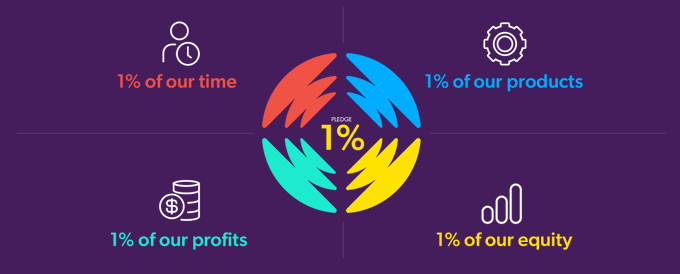
Originally published on GlobalNewswire.
MONTREAL and SAN FRANCISCO, Aug. 08, 2022 (GLOBE NEWSWIRE) — Coveo (TSX:CVO), a leader in relevance platforms that transform search, recommendations, and personalization within digital experiences, announced today its first round of contributions under Pledge 1%, a global movement to inspire, educate, and empower all companies to leverage their assets for good. Coveo will contribute time, products, expertise and money to support programs with a focus on organizations that provide learning and growth opportunities, including knowledge-sharing and mentoring, technical access, and financial assistance for young people (12-18 years old) in vulnerable social groups.
“At Coveo, we believe equal and unconstrained access to knowledge and education is the ultimate social equalizer,” said Louis Têtu, Chairman and CEO at Coveo. “We view this pledge as an investment in our community and our future. However, we also see this as a pathway to building a stronger company where shared values and commitment will drive us forward together. Pledge 1% puts us in a great position to build both a stronger business and brighter future.”
Coveo commits to its 1-1-1-1 pledge through the following means:
- 1% of its time by launching Deed, a Volunteering Hub where employees will be able to access and create volunteer opportunities, log hours, and track their impact.
- 1% of its equity to several organizations within the educational, inclusion, and environmental spheres including Actua, LOVE, Pour 3 Points, Girlstart, Interligne, and Environmental Defence.
- 1% of its time and product by offering software and consulting to Alloprof, a Quebec-based non for profit that offers parents and students aged 6-17 free, practical resources to help them succeed along their academic journey.
“By leveraging Coveo’s industry-leading AI technology, Alloprof will be able to create a better website search experience that will help students find the learning content they’re looking for,” said Sandrine Faust, co-founder and executive director of Alloprof.
In addition to community support efforts, Coveo will also commit to minimizing environmental impact, promoting the wellbeing and growth of Coveo employees, and adhering to the highest levels of corporate governance to ensure it’s doing what is right for all company stakeholders.
“In this era of increasing digitalization, leading tech companies like Coveo have a particular responsibility to share technology, expertise and even profits and equity to create better access to tools, information and opportunities,” said Sheila Morin, SVP – Marketing & ESG at Coveo. “Just as Coveo is committed to making a difference for our customers, we’re also committed to making a difference in our community. Through the Pledge 1%, we can help democratize knowledge and education, which are key levers for human wellness, to combat poverty, and to reduce inequalities and this first round of donations is just the beginning.”
About Coveo
We believe that relevance is critical to winning in the new digital experience economy. Coveo is a market-leading AI-powered relevance platform. We aim to enable our customers to deliver the relevant experiences that we believe people expect in the new digital economy. Our SaaS-native, multi-tenant platform injects search, recommendations, and personalization solutions into digital experiences. We provide solutions for Ecommerce, service, website, and workplace applications. Our solutions are designed to provide tangible value to our customers by helping drive revenue growth, reduce customer support costs, increase customer satisfaction and website engagement, and improve employee proficiency and satisfaction.
Our AI powers relevant interactions for hundreds of the world’s most innovative brands and is supported by a large network of global system integrators and implementation partners.
Coveo is a trademark of Coveo Solutions, Inc.
Learn more about Coveo and their impact here.
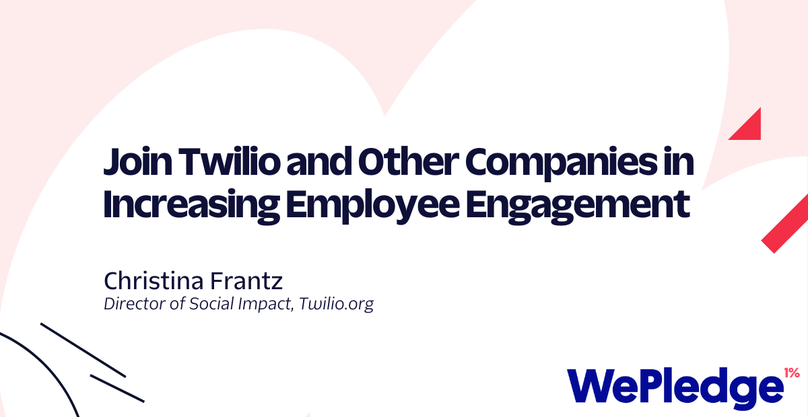
Originally published on Twilio.
At Twilio, we believe that one of the most effective ways to prioritize social impact is to empower our employees to do more of what they love. That’s why, inspired by the Pledge1% model, Twilio created WePledge 1%, a volunteer employee impact and giving program in which Twilio supports employees in pledging to give 1 percent of their own time, income, or equity (or any combination of the three) to causes that resonate with them.
Since Twilio created WePledge 1% in 2019, 3,605 Twilio employees have signed onto the program, and participation in our volunteer and giving programs has increased to over 50% from single digits. And there are other ripple effects, too. We’ve seen that over the past year, employees who donated and volunteered were 2.3x less likely to leave Twilio than those who didn’t. And it’s not just Twilio seeing positive results. Data shows that companies with giving programs have 2.3x the employee retention rate than those without one.
Inspired by the increased impact we saw among our own employees, Twilio developed the WePledge 1% Accelerator, which is a comprehensive program that equips impact leaders at companies with all the tools, templates, and support needed to successfully launch an employee impact program of their own within 5 months. 25 companies including Atlassian, Zoom and Okta have already joined the program. In September, we’re launching our third Accelerator, where we’ll walk even more companies through how to stand up a similar program to support their employees in making a difference.
Learn more about Twilio and WePledge 1%
.

Originally published on Tides.
Decades after the term “digital divide” was coined, this systemic inequity persists, preventing too many people from living a quality life—and sometimes even to survive. In the past two years, the COVID-19 pandemic has exacerbated the gulf between those with internet access and those without, as necessary activities like seeking healthcare, education, and jobs have moved online.
For our Corporate Impact Leaders Forum (CILF) series, Strategies to Bridge the Digital Divide, Tides recently brought together four panelists, experts in the subject of equity and the digital divide, to identify challenges and solutions. Led by Amy Lesnick, chief executive and president of Pledge 1%, the panel included Jen Stredler, vice president of workforce development at Salesforce; Ellen McClain, COO of Year Up; and Caroline Barlerin, founder and CEO of Platypus Advisors.
Lesnick opened the discussion with sobering statistics that paint a grim picture: 43 percent of adults with lower incomes do not have access to home broadband and 41 percent don’t have access to a desktop or laptop. Nearly half of Americans without home internet are either Black or Hispanic. And while the Biden administration allocated more than $65 billion to broadband through the Infrastructure Investment and Jobs Act, broadband alone is but one small piece of the digital divide.
“It’s an enormous challenge, especially for vulnerable populations,” Lesnick said. “In many cases, the digital divide is not only a result of historical inequities, but also perpetuates them. And COVID-19 has only highlighted and in many cases exacerbated these inequities.”
Stredler, vice president of workforce development at Salesforce, acknowledged the enormity of the issue. “The problem and the scope of the challenge is vast,” she said, noting that the many factors causing this divide must be tackled by leveraging the unique roles and assets that different companies can bring. “We can’t all do everything, and we can’t all do it alone.”
Ellen McClain, COO of Year Up, focused on the root issue during the panel discussion. “The digital divide is deeply, deeply rooted in the systemic issues, including systemic racism, that have plagued our nation from its inception,” she said. McClain identified the global response to George Floyd’s murder as a catalyst, pointing to the “fundamental systemic unfairness” that continues to wreak havoc in our country.
In the face of a challenge so complex and embedded, what can companies do? A lot, according to McClain. “We operate with a fundamental belief that corporations can and do play a role in advancing equity and justice and the conditions for our communities and economy to thrive,” she said of her team at Year Up.
All panelists agreed that collaborative efforts are crucial in the face of these challenges. As Stredler pointed out, it’s “not sustainable for every company to support every need of every person. But,” she went on, pointing to the importance of partnership, “we’ve tried to mitigate immediate needs and then work with our partners to develop a more systemic and scalable solution.”
And while systemic and scalable solutions are absolutely essential to resolve these challenges, the need for hyperlocal solutions is also key to making progress.
Click here to continue reading about how place based solutions are crucial to combat the digital divide, and how it impacts jobs and livelihoods.
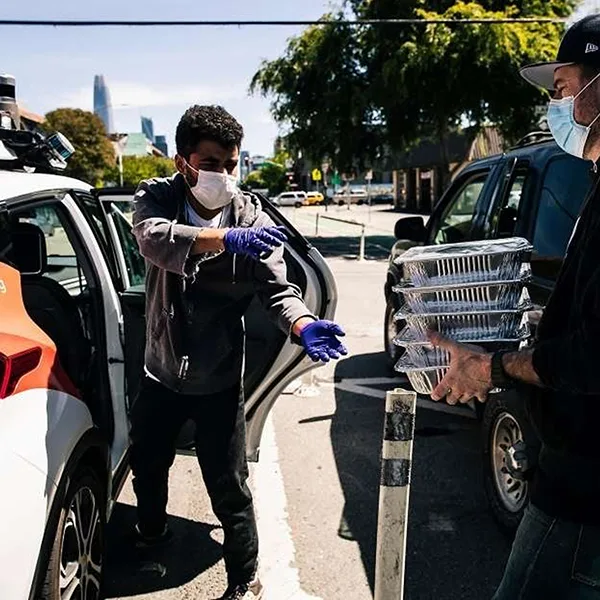
Originally published on San Francisco Business Times.
When Cruise’s all-electric autonomous vehicles began logging their first miles on San Francisco streets, they weren’t taxiing ride-seekers to jobs, shops or bars. The cars, known as AVs, were delivering free groceries and meals to the city’s low-income residents.
It was the early days of the pandemic, when food insecurity was climbing at alarming rates. The number of households relying on the San Francisco-Marin Food Bank had nearly doubled from 32,000 a week to almost 60,000, according to Amanda Lenaghan, Cruise’s head of Social Impact. “Our Cruise AVs were able to help the food bank quickly scale their deliveries in order to meet that increasing need,” Lenaghan said.
Two years later, food insecurity still remains an issue in San Francisco. People relying on food assistance programs has risen 42 percent since 2019. To serve those in need, Cruise continues to partner with both the SF-Marin Food Bank and SF New Deal as part of its Cruise For Good social impact program. The company declined to disclose the value of the partnership.
Cruise AVs deliver food to homebound seniors, people with disabilities, struggling young families that can’t travel to food banks, and nonprofit food distribution services. To date, Cruise AVs have made more than 127,000 food deliveries using 100 percent clean energy. Of the 2 million meals Cruise For Good has delivered, 80 percent have gone to households living below the poverty level.
These families, as well as the SF-Marin Food Bank and SF New Deal, were actually Cruise’s first customers. Cruise, started in 2013 and majority owned by General Motors, manufactures all-electric self-driving vehicles that harness renewable energy. The company, which has raised more than $15 billion to date, in June it became the first autonomous vehicle company to offer fared rides to the public in San Francisco.
“Cruise is in the early stages,” Lenaghan explained. “It’s exciting to have already made these commitments to the community and to have baked social impact into our DNA.”
“In March 2020, we needed to pivot our services quickly to support a community sheltering in place, and our Home-Delivered Groceries program grew from serving a couple thousand households to serving over 10,000 households each week. Cruise was one of our earliest partners in Home-Delivered Groceries – they came to us right at the start of the pandemic and asked, “how can our technology help?” Their continued partnership is a testament to how companies can use innovative tech in partnership with community organizations to make a profound impact on the lives of so many people.”
“As we look forward, we know the impacts of Covid-19 will be with us for a long time,” said Michael Wirkkala, chief operating officer at San Francisco-Marin Food Bank. “Even now, more than two years into the pandemic, our Home-Delivered Groceries service has remained steady at more than 10,000 deliveries every week. Big challenges like food insecurity are more complex than many people realize, and tackling them requires innovation and collaboration.”
In addition to launching Cruise For Good, Cruise has joined Pledge 1%, a global philanthropic movement that encourages companies to adopt business paradigms that include social impact programs. Through this partnership, Cruise has made a commitment to dedicate at least 1 percent of its fleet to give back to the communities it serves.
“We’re really pleased to be the first AV company that’s a part of the Pledge 1% movement,” Lenaghan said. “For Cruise being early in this nascent industry, we not only can think about how we can address issues facing our community today, but also how we can influence others in our industry to think similarly.” Looking forward, Cruise will continue its commitment to fighting food insecurity and is also looking at ways to contribute to workforce development, Lenaghan said: “This is just the beginning.”
Read article on the San Francisco Business Times.
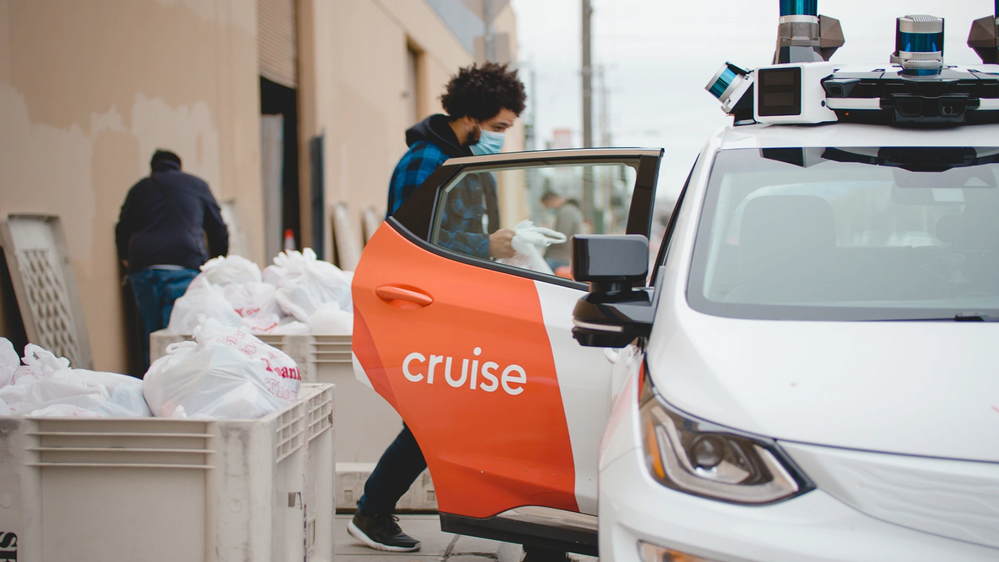
Originally published on Cruise.
What could we achieve if companies made social impact core to their business strategy?
That question has guided Cruise’s social impact philosophy from the start. The answer is stretching our conceptions of how AVs can and should serve our communities — and how quickly we could make an impact.
When COVID-19 first hit and food insecurity skyrocketed in San Francisco, it became clear we could make an immediate positive contribution with our fleet. We decided the most effective way to support our neighbors was to plug in with community organizations who had expertise fighting food insecurity. As a result, we launched two long-term partnerships in early 2020, with the San Francisco-Marin Food Bank and the SF New Deal, to deliver meals to residents in need, while also helping local restaurants. Nearly two and a half years later, our fleet of AVs has now delivered more than two million meals (and counting) to residents most in need in San Francisco, as part of our signature social impact program, Cruise for Good.
Yesterday, we were humbled that the San Francisco Business Times recognized Cruise with the 2022 ‘Beyond the Check’ Award in the Community Impact category. This award is the result of collaboration between many people and many teams – across multiple organizations. While we’re proud of our commitment to uplifting the communities where we operate, we wanted to take this opportunity to acknowledge our partners, the SF New Deal and San Francisco-Marin Food Bank, and share more about what we’ve learned through these partnerships. After all, it’s their willingness and commitment to innovate with us, respond quickly to community needs, and adapt to evolving pandemic dynamics that have made this collective impact possible.
What we’ve accomplished together, so far
Together, we have delivered 2.2 million meals to residents across San Francisco. What does that number look like when broken down? It equates to 120,000 deliveries, 80% of which are delivered to zip codes below the poverty line. And because our fleet is all electric, and powered by 100% renewable energy, we’ve offset more than 100 metric tons of CO2 emissions.
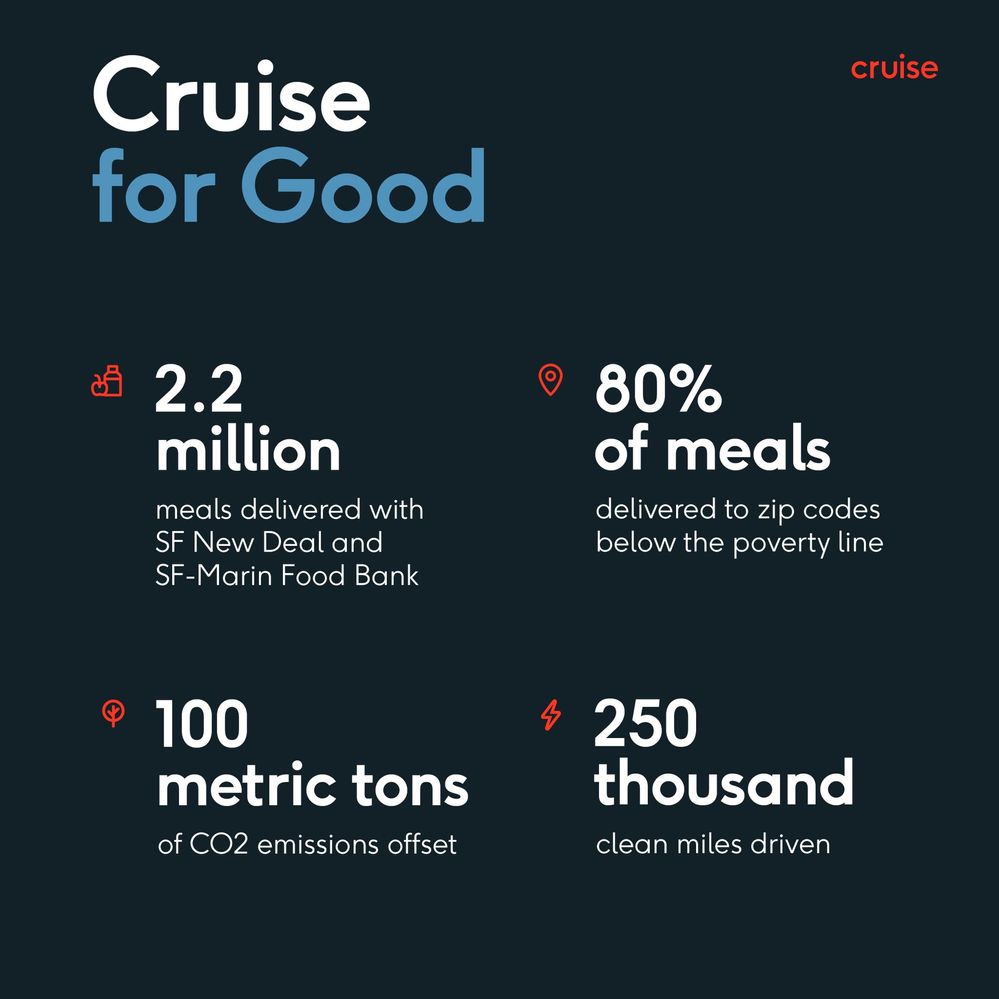
Many of our deliveries with the SF New Deal also support local, small businesses, like Old Skool Cafe, a San Francisco restaurant that also provides workforce training for justice involved youth.
Learn more about Cruise’s innovation through partnership and their commitment to social impact here.

Originally posted on Entrepreneur.
Corporate success is no longer measured just in dollars and cents. Investors, employees and customers alike are all paying closer attention to non-financial factors like environmental, social and governance standards.
Last year, I went to our board with the idea of joining the 1% Pledge, a global movement to support our community investments and philanthropy. The big idea is to pledge 1% of our employee’s time, 1% of our products and capabilities, 1% of our profits and 1% of our entire equity. Our goal as the first Canadian public company to launch this major initiative, is to inspire, educate and empower all companies to leverage their assets for good.
It was on the run-up to our IPO, so we were asking a lot by traditional business metrics. But without hesitation, our board and investors were on board. Along with our leadership, they understood that investing 1% of our company’s profits, time, product and equity to support charities and causes in our community will pay its own dividends. And that’s okay, because what’s good for business can be great for society, for the planet, for people and for prosperity.
Corporate success is no longer measured just in dollars and cents. An organization’s market value is still measured by its stock price, or determined by its valued assets, its position in the market, its unique distinctive competence, the value it brings to its customers and its market potential. However, investors and employees — and customers — are paying closer attention to how you do business, along with how well you do it and what you deliver.
Increasingly, non-financial factors or environmental, social and governance (ESG) standards are being used to evaluate companies for a cultural fit and identify risk and/or growth opportunities. To ensure your organization meets these new standards, you must start by instilling a sense of purpose and accountability within your people, one that is genuine and purposeful.
When you instill purpose, everything else follows
If you think in terms of two bottom lines, let’s call them EBITDA and ESG, how do you find a middle ground that ensures both expectations are met? You can do this by instilling a set of purpose-based values.
Around the world, companies have made billions of dollars by simply connecting people, inspiring them to work together and caring for them. You can’t build an effective organization unless you mobilize people around a common purpose, one that’s meaningful to them and society, and ideally one that’s beyond what the company does all day, every day. Employees shine brightest when they share common goals and beliefs beyond their day-to-day roles.
Of course, making ESG a sustainable corporate competency means making it core to your company’s culture. You can’t achieve that with a slogan or a slide. You have to demonstrate, often daily, your commitment to doing well by doing good. The aim is for employees to feel that working together to support goals for their community and not just the company is not only encouraged, but expected. The shared purpose builds cohesion and engagement, driving loyalty, innovation and growth.
Make a lasting impact in our community
Part of the challenge is finding a sense of purpose that fits your company and culture and unites your team. Finding that sense of shared purpose can and should be part of the journey.
When my company took the 1% pledge, it started as a commitment to philanthropic leadership and supporting a global ESG initiative. This helped us to quickly find our focus: the democratization of knowledge through education and technology.
Equal, accessible and unconstrained access to knowledge is a key lever for human wellness, combats poverty, reduces inequalities and bolsters purpose. Now we are rolling up our sleeves and starting to work with local programs that put this ideal into action. Our aim is to open new doors in our community by democratizing business with access to technology and using educational and employment opportunities as tactics for combating inequality. We truly believe that when everyone has access to the tools and resources they need to succeed in business or education, we all benefit.
The benefits of committing to ESG
I care about being a good citizen and the wellness of our people and customers, and I’m grateful for the opportunity to use our company’s success to make the world a better place. Giving back and being part of the solution unites our company and shapes our culture, and increasingly our customers agree and engage.
But adopting an ESG strategy requires commitment. It’s key to establish metrics, measure them on a regular basis, and share progress publicly. You have to make sure you walk the walk. The good news is that ESG success has a positive impact on so many levels: for the community, planet, employees and company. We’ve found that embracing an ESG strategy, substantiated by the 1% pledge, has been an important way to attract talented people, customers and partners who have the same desire of building a better world. And that’s helping us build both a stronger business and brighter future.